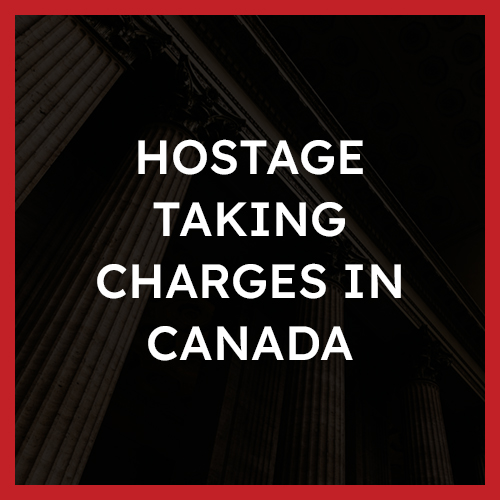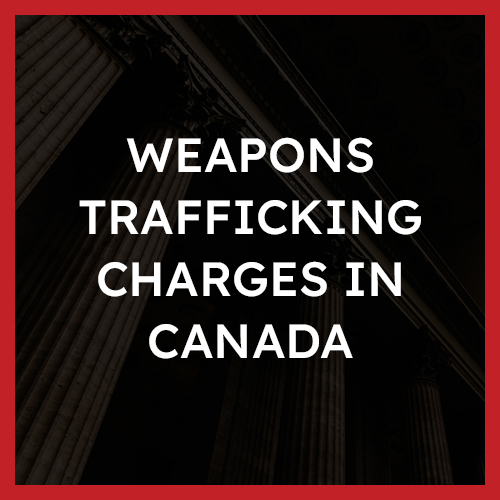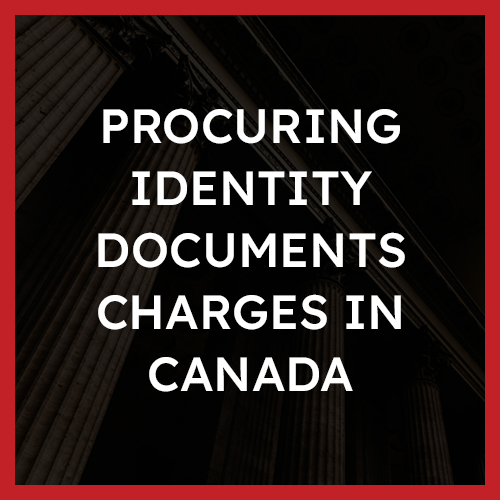Hostage Taking (s. 279.1(1)) Charges in Canada: Offences, Defences, Punishments
What is “hostage taking” in Canada?
 Hostage taking is criminalized under s. 279.1(1) of the Canadian Criminal Code. It involves three main acts:
Hostage taking is criminalized under s. 279.1(1) of the Canadian Criminal Code. It involves three main acts:
- Inducing a person, group, state, international organization or intergovernmental organization other than a hostage to commit or cause to be committed any act or omission as a condition, whether express or implied, as a contingency for the release of the hostage (i.e., “I will release this person or persons if you give me a sum of money”);
- confining, imprisoning, forcibly seizing or detaining a person or persons; and
- uttering, conveying or causing any person to receive a threat that the death of, or bodily harm to, a hostage will be caused or that the confinement, imprisonment or detention of the hostage will be continued.
Hostage taking is a serious offence in Canada. The Crown does not have the liberty to choose whether to proceed as indictable or summarily as Hostage taking is a straight indictable offence.
Examples
Some examples of hostage taking might include:
- Forcibly confining someone and leveraging their imprisonment for monetary or any other kind of compensation
- Forcibly confining someone to achieve a political or social objective.
- Holding your own kids against their will or against a partner or ex-partner’s will with the threat of harm to them to confer some sort of benefit.
- Threatening death, harm or continued imprisonment of a person or persons as leverage for monetary or another kind of compensation.
Defences
Defending against a hostage taking charge can be difficult. Because the actus reus (the physical act) of the offence requires calculation (leveraging a victim’s helplessness for the attainment of some type of benefit), disproving intent to commit the offence proves to be challenging. Certain defences like intoxication may be available, however, this is very case specific and infrequent. Our lawyers will consider every possible avenue in constructing a fair defence including considering any applicable Charter defences.
Punishment
The maximum punishment for taking a hostage is life imprisonment. The minimum penalty depends on the circumstances:
- If the offence involves aggravating factors such as the use of a firearm in association with a criminal organization (e.g., gang-related):
- the minimum penalty is 5 years imprisonment for a first-time offence of this nature (see: Criminal Code section 279.1(2)(a)(i)); and
- minimum 7 years imprisonment for a second or subsequent offence of this nature (see: Criminal Code section 279.1(2)(a)(ii).
- If a firearm was used in the commission of the offence, the minimum penalty is four years imprisonment (see: Criminal Code section 279.1(2)(a.1)).
- All other scenarios carry no minimum penalties but can be sentenced up to life imprisonment (see: Criminal Code section 279.1(2)(b)).
Overview of the Offence
Hostage taking is covered under sections 279.1(1)-279.1(2.2) of the Canadian Criminal Code:
Hostage taking
1(1) Everyone takes a person hostage who — with intent to induce any person, other than the hostage, or any group of persons or any state or international or intergovernmental organization to commit or cause to be committed any act or omission as a condition, whether express or implied, of the release of the hostage.
(a) confines, imprisons, forcibly seizes or detains that person; and
(b) in any manner utters, conveys or causes any person to receive a threat that the death of, or bodily harm to, the hostage will be caused or that the confinement, imprisonment or detention of the hostage will be continued.
(2) Every person who takes a person hostage is guilty of an indictable offence and liable
(a) if a restricted firearm or prohibited firearm is used in the commission of the offence or if any firearm is used in the commission of the offence and the offence is committed for the benefit of, at the direction of, or in association with, a criminal organization, to imprisonment for life and to a minimum punishment of imprisonment for a term of
(i) in the case of a first offence, five years, and
(ii) in the case of a second or subsequent offence, seven years;
(a.1) in any other case where a firearm is used in the commission of the offence, to imprisonment for life and to a minimum punishment of imprisonment for a term of four years; and
(b) in any other case, to imprisonment for life.
As with virtually every criminal offence, the Crown must prove both the actus reus (the offence’s physical act) and the mens rea (the mental element of the offence) to secure a conviction. Discussions of both are held directly below.
The Guilty Act (Actus Reus)
In these instances, the actus reus (the physical act of committing the offence) is usually quite obvious. The components of this type of offence can be broken up into two parts.
In plain language, the two actus reus components of a hostage taking offence include:
- Imprisoning, confining, detaining or seizing a person or persons (the hostage(s)); and
- Threatening explicitly or implicitly death, bodily harm continued imprisonment, or detention upon the hostage(s).
To prove these two aspects of the offence, the Crown will need to bring forward evidence which demonstrates that all three elements are met.
The Guilty Mind (Mens Rea)
Hostage taking is what we call a “specific intent” offence. This means that the Crown is required to demonstrate the actual intent of the accused themself at the time of the offence as opposed to only needing to prove that the offender knew they were committing the offence. To prove the crime of hostage taking, the Crown must show that the accused intended to ‘force the hand’ of or compel a person, group, state, international organization or intergovernmental organization other than the hostage to commit an act or omit to do something (usually this is to the hostage taker’s benefit but it doesn’t need to be).
To demonstrate this, the Crown will present evidence which establishes that the hostage taker was leveraging the victim’s innocence and vulnerability as a means of achieving some sort of goal. Because the motives of offenders may differ from offence to offence, the Crown must appreciate what the intent of the accused was at the time of the offence to make out the crime of hostage taking. This is important in differentiating between a crime like kidnapping and hostage taking. The mens rea element in hostage taking is different from say kidnapping because the intent lies in leveraging a hostage to achieve a certain goal whereas in kidnapping the mens rea resides in the intent to confine, imprison, transport, etc. against the victim’s will.
Defences
Every hostage taking case is different. There is no single defence that can be applied to every allegation of hostage taking. It is unlikely that if you are charged with hostage taking that you can escape criminal liability in its entirety. This is because even if all of the elements of the hostage taking offence cannot be made out, then any remaining elements, such as confining or imprisoning a person can still constitute kidnapping or another offence against the person. In this case, a common defence in avoiding a kidnapping charge is to show that the person held ‘captive’ consented to the act. You can read our kidnapping article.
Specific intent defences are available such as the defence of intoxication, however, this type of defence is rarely available and even when used, it is often only used as a mitigating factor and not as a defence against criminal liability as a whole. It is also important to note that Parliament as per section 17 of the Criminal Code has legislated against the application of the duress defence in cases of hostage taking. Our lawyers will of course consider every legal avenue and defence available to a charge of hostage taking and catalogue all of the mitigating factors associated with the charge. This detailed analysis of your case will of course include considering all potential Charter defences to ensure that all of your constitutional rights are properly upheld and that any evidence obtained unconstitutionally, is thrown out.
Punishments
Hostage taking is a straight indictable offence in Canada. This is the most serious type of criminal offence in Canada. The maximum sentence for hostage taking in Canada is life imprisonment. The minimum sentence depends on the aggravating circumstances of the offence committed.
| Aggravating Factor | Minimum Sentence | Maximum Sentence |
| Firearm used in affiliation with a criminal organization |
|
Life imprisonment |
| Firearm used | 4 years imprisonment | Life imprisonment |
| All other cases | No minimum | Life imprisonment |
Other ancillary sentences that could be implemented independently or alongside a term of imprisonment could include (but aren’t limited to):
- Firearms prohibition (see: sections 109 and 110 of the Criminal Code);
- Probation (see: section 731 of the Criminal Code);
- An order for a DNA sample to be entered in the national DNA Databank (see: section 487.051 of the Criminal Code);
- Restitution (this is financial compensation ordered by the court to be made out to the victim of the crime) [see: section 738(1) of the Criminal Code];
- Victim protection orders and communication bans (see: sections 21, 732.1(3)(a.1), 732.1(3)(h), 742.3(2)(a.3), and 742.3(2)(f) of the Criminal Code); and/or
- Victim Surcharge Fine (victim surcharge fines are court-ordered fines made out to a public victim fund which is then distributed to victims on an ad hoc basis) [see: section 737 of the Criminal Code].
Note: this list is not exhaustive, and sentences could extend beyond this list of prospective sentencing orders.
Courts have determined that the primary goals of sentencing in cases of hostage takings are to denounce the act of hostage taking and to deter both the offender and the general public from committing such an act (see: R v Ader, 2018 ONSC 2351 (CanLII)). Furthermore, the courts have established that a sentence for hostage taking must “reflect society’s concern about, and contempt for, such interference in personal liberty and the resulting trauma” (see: R v Cook (N.), 2014 MBCA 29 (CanLII)).
Frequently Asked Questions
Will you go to jail for taking someone hostage?
Terms of imprisonment are highly likely in cases of hostage takings. This is because in many instances hostage taking carries with it a minimum mandatory custodial sentence. While it is not statutorily impossible to receive a non-custodial sentence for hostage taking, this is unlikely given the precedence set for these types of offences. Courts move their focus to deterring and denouncing behaviour of this kind through relatively harsher sentences. This is because these types of offences can inflict both societal and personal trauma. Sentences for this type of offence rarely fall below 10 years imprisonment (see: R v Thind et al., 2011 ONSC 6635 (CanLII); R v Sidhu, 2013 ONCA 719 (CanLII); and R v Cook (N.), 2014 MBCA 29 (CanLII)).
Is hostage-taking a serious offence?
Yes. Hostage taking in Canada is a straight indictable offence. Indictable offences in Canada are the more serious of the two types of offences (indictable and summary) in Canadian criminal law. Statutorily enforced mandatory minimum sentences of imprisonment also demonstrate to the public that these types of offences are taken seriously by the criminal justice system and prosecuted earnestly.
How long must you hold someone for it to be considered hostage-taking?
Hostage taking has nothing to do with the length of time one is holding another (or others) captive. The criminalized act under section 279.1(1) of the Criminal Code is imprisoning, confining, detaining or seizing a person or persons (the hostage(s)) and threatening explicitly or implicitly death, bodily harm, continued imprisonment or detention upon the hostage(s) in order to ‘force the hand’ of or compel a person, group, state, international organization or intergovernmental organization other than the hostage to commit an act or omit to do something (usually this is to the hostage taker’s benefit but it doesn’t need to be). Should all of these factors be met, both the mental and physical elements of the crime will be made out and a conviction may be reached. For example, you could hold someone for only three minutes but if during those three minutes, you confined them and you threatened harm against them in a ploy to leverage some sort of act or omission be carried out by a party besides the hostage, you have in technical terms, committed the crime of hostage taking.
Published Decisions
R v Ader, 2017 ONSC 7052 (CanLII)
Mr. Ader was charged with hostage taking when in 2008 he and others unlawfully took Amanda Lindhout and Nigel Brennan hostage in Somalia, and over the span of 15 months threatened to kill them to induce others including Amanda’s mom and the government to pay a ransom contrary to section 279.1 (2) of the Criminal Code. The accused communicated ransom demands and threats to harm the two hostages if the ransom of $2 million was not paid to the hostage takers. Mr. Ader also acted as the negotiator for the hostage takers during much of Amanda’s captivity.
You can read the full case here.
About The Author
Ask A Question
We endeavor to respond to questions within 24 hours. If your matter is urgent, please call our office or submit a request for a free consultation.







